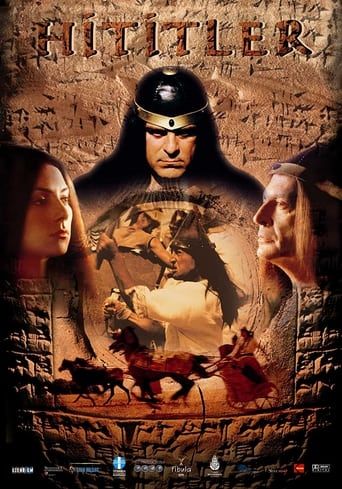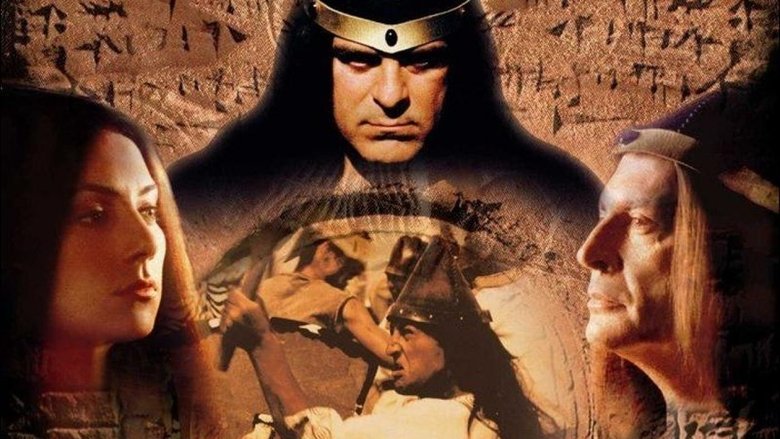

The Hittites - A Civilization that Changed the World (2003)
This is the glorious story of the Hittites - the most powerful people in the Near East of their time. Narrated by Academy Award winner Jeremy Irons, "The Hittites" brings the fascinating history of this mighty empire to life with expert interviews, stunning cinematography, dramatic reenactments, and visual effects. Highlights include a breathtaking recreation of the controversial battle of Kadesh that decimated the armies of Egypt's Pharaoh Ramesses II. Based on the actual words of the Hittites, deciphered from ancient clay tablets excavated in the 20th century, their story unfolds as beautifully as it written almost 3500 years earlier.
Watch Trailer
Cast
Reviews
Please don't spend money on this.
Don't listen to the negative reviews
Admirable film.
Through painfully honest and emotional moments, the movie becomes irresistibly relatable
Produced in association with two Hollywood producers, whose credits include RENDEZVOUS WITH DESTINY (2016), JAMES ELLROY'S LA (2011), and OUT OF Egypt (2009), this is a big-budget documentary focusing on the Hittite civilizations with a cast of Turkish stars including Haluk Bilginer, Fikret Kuşkan and Sanem Çelik.Narrated by Jeremy Irons (in English) and Cüneyt Türel (in Turkish), Tolga Örnek's film traces the growth and development of a people whose empire once covered most of the Middle East. Through a combination of re-enactment, CGI effects, expert testimonies and shots of ancient artifacts, the film tells the story of a series of kings, both weak and strong, who were responsible for the contraction and the expansion of Empire. The best kings were often despotic in attitude, but they knew how to manage an army as well as initiate the best military tactics to ensure victory. They also spent money on fortifying their major cities, notably at Hattuşa in Central Anatolia (the remains of which can still be seen near the village of Boğazköy).Örnek's film stresses the beneficial aspects of Hittite rule: its emphasis on the rule of law where justice was meted out fairly with the punishment suiting the crime; the emphasis on preserving social harmony through the provision of well-designed cities (even though they were rigidly socially stratified); the importance of religion, especially the worship of several gods who both sanctioned and censured human activity; and the power of myth, which not only held Hittite society together but helped law the foundations for the mythologies of later nations such as the Ancient Greeks and Romans. Hittite cultures were very absorbent; whenever they conquered a nation, they often appropriated its gods rather than trying to impose their religion on others. It was this quality that helped give rise to so many different mythologies once the Hittite race had died out.HITITLER also emphasizes the race's military and diplomatic abilities. They held on to power for centuries as a result of skillful planning, as well as maintaining a tough regime where soldiers were expected to conform to certain preset masculine ideals. On the other hand the Hittites were also responsible for the first major military treaty, which they signed with the Pharoah Rameses II of Egypt following the Battle of Kadesh. They understood that global peace could be sustained by peaceful as well as aggressive means.Ideologically speaking, Örnek's film follows his previous documentary on Mount Nemrut (2001) in stressing the uniqueness of Hittite cultures as a forerunner of today's Turkish cultures with strong leaders at the helm of both. On the other hand HITITLER also stresses the importance of Hittite culture as a bridge between East and West, a concept that persists today in Turkish cultures. It is this ability to negotiate between cultures that has helped to sustain peace; if we recognize that ability, then we can follow the Hittites' example and do the same thing in our own times.To be honest, the documentary does become a little bogged down in historical minutiae, especially in the way it chronicles the reign of one king after another. Perhaps there ought to have been more emphasis on the Hittites' legacy rather than on historical narrative. Nonetheless the film is ravishing to look at with its spectacular battle sequences and use of bright colors and striking imagery to make its points.
1,000 years before the golden age of Greece, Hittites ruled Asia Minor and the northern Levant. In 1595 BCE they sacked Babylon. In 1274 BCE they routed the armies of Ramases II, mightiest pharaoh in Egypt's history. They perfected chariot warfare, fielding 40,000 men and 3,500 chariots, 900 miles from home.Theirs is the oldest known writing in an Indo-European language.They built with stone blocks of up to 40 tons: 3500 years later, a piece of paper still can't be slipped between the blocks. Their capital Hatusha (Bogazkoy) rivaled Babylon or Thebes: far larger than ancient Athens or Troy, it boasted plumbing, sewers, fountains.Their myths are repeated by Hesiod and Homer; their storm god became the Greeks' Zeus. They were masters of diplomacy and personal contact in international relations. Their scribes maintained archives for centuries--which the rulers read, knowing the roots of the present are in the past.They instituted a system of justice based on compensation rather than retribution.The movie is an eye-opening view of a little-known chapter in human civilization. The records left by the Hittites, and deciphered by 20th-century archaeologists, tell the personalities of the rulers, the religious attitudes, the physical, military, and social environment, of a lost but important civilization.
Hittites are a lost and less known civilization lived thousands of years ago, tens of decades before Christ in Anatolia, the cradle of ancient civilizations. The movie is rather a full length documentary and a fine told story about 120 minutes. I watched the DVD version which was also well prepared even with some bonus DVD giving out the details and efforts on how the film was made.Tolga Örnek, a young and hard-working Turkish director, who is well known with his two consequent documentaries Atatürk and Mount Nemrut which were also successful, wrote, designed and directed Hittites.The movie used digital technology as well as filming on locations in Turkey, Syria and Egypt took almost 2 years to be prepared. Several archaeologists were interviewed and a fine cast of Turkish film industry took role in dramatizations. The most important role of Hittites in history were that they had been a bridge between the west & the east, they had improved diplomacy and maintained peace not only with wars but politics, and most importantly they had written down what they did for the next generations.The visual effects including models and computer animation makes the movie look like a high budget one, though I presume most of the budget was spent on research, post production and location shots.With the beautiful original soundtrack and the wonderful nature shots made in Anatolian landscape, the story goes smooth and mysterious as the Hittites were. As a result, I highly recommend the movie especially to people devoted in history and world peace.


